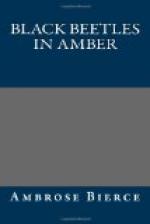Then, even as I lamented, lo! there came
A troop of Presences—I knew
not whence
Nor what they were: thought cannot rightly name
What’s known through spiritual evidence,
Reported not by gross material sense.
“Why come ye here?” I seemed to cry (though
naught
My sleeping tongue did utter) to the first—
“What are ye?—with what woful message
fraught?
Ye have a ghastly look, as ye had burst
Some sepulcher in memory. Weird creatures,
I’m sure I’d know you if ye had but features.”
Some subtle organ noted the reply
(Inaudible to ear of flesh the tone):
“The Finest Climate in the World am I,
From Siskiyou to San Diego known—
From the Sierra to the sea. The zone
Called semi-tropical I’ve pulled about
And placed it where it does most good,
I trust.
I shake my never-failing bounty out
Alike upon the just and the unjust.”
“That’s very true,” said I, “but
when ’tis shaken
My share by the unjust is ever taken.”
“Permit me,” it resumed, “now to
present
My eldest son, the Champagne Atmosphere,
And others to rebuke your discontent—
The Mammoth Squash, Strawberry All the
Year,
The fair No Lightning—flashing
only here—
The Wholesome Earthquake and Italian Sky,
With its Unstriking Sun; and last, not
least,
The Compos Mentis Dog. Now, ingrate, try
To bring a better stomach to the feast:
When Nature makes a dance and pays the piper,
To be unhappy is to be a viper!”
“Why, yet,” said I, “with all your
blessings fine
(And Heaven forbid that I should speak
them ill)
I yet am poor and sick and sad. Ye shine
With more of splendor than of heat:
for still,
Although my will is warm, my bones are
chill.”
“Then warm you with enthusiasm’s blaze—
Fortune waits not on toil,” they
cried; “O then
Join the wild chorus clamoring our praise—
Throw up your beaver and throw down you
pen!”
“Begone!” I shouted. They bewent,
a-smirking,
And I, awakening, fell straight a-working.
A “MASS” MEETING
It was a solemn rite as e’er
Was seen by mortal man.
The celebrants, the people there,
Were all Republican.
There Estee bent his grizzled head,
And General Dimond, too,
And one—’twas Reddick, some one said,
Though no one clearly knew.
I saw the priest, white-robed and tall
(Assistant, Father Stow)—
He was the pious man men call
Dan Burns of Mexico.
Ah, ’twas a high and holy rite
As any one could swear.
“What does it mean?” I asked a wight
Who knelt apart in prayer.
“A mass for the repose,” he said,
“Of Colonel Markham’s”——“What,
Is gallant Colonel Markham dead?
’Tis sad, ’tis sad, God wot!”
“A mass”—repeated he, and rose
To go and kneel among
The worshipers—“for the repose
Of Colonel Markham’s tongue.”




